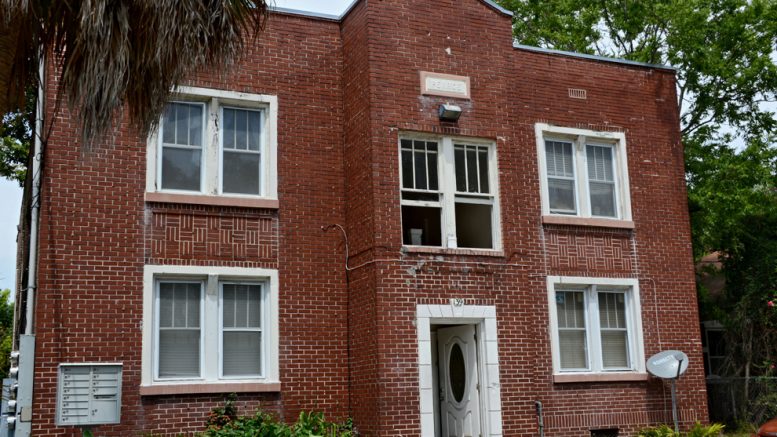A local nonprofit says a politically connected businessman gave campaign donations to former Mayor Alvin Brown and other officials as he tried to kill the group’s proposed apartment complex for homeless people and that city officials retaliated against the group after it sued the city for housing discrimination.
The nonprofit, Ability Housing, added the allegations to the existing lawsuit it filed against the city after it refused to grant the paperwork needed to build a 12-unit apartment complex in Springfield that would have catered to the city’s chronically homeless and disabled population.
Some of the latest accusations focus on Jack Meeks, a businessman and Springfield landowner, who the nonprofit said spearheaded a campaign to stop its project.
Meeks, who requested the opinion the city issued in 2014 that declared Ability Housing couldn’t build the Springfield apartments, hired lobbyists to make his case to government officials and gave political donations to several of them after they expressed support for his cause, according to the nonprofit’s lawsuit and related depositions.
Meeks, who isn’t a defendant in the lawsuit, said he never donated money to officials in exchange for their support and said the lawsuit wrongly portrays him as a “puppet master” behind the city’s rejection of the project.
“If I was able to do that, this neighborhood would be in a lot better shape than it is,” Meeks said. “We all have a constitutional right to petition government. … They’re complaining about what I did, but they exercised their right in the same fashion.”
In one episode described in the suit, Meeks met with Brown to discuss his opposition to the apartments several weeks after he requested the opinion on the project in March 2014.
During the May 2014 meeting, Brown told him to meet with the city’s planning director — a mayoral appointee responsible for issuing the opinion — and asked Meeks for a donation to his re-election campaign, according to the lawsuit.
At the end of May 2014, then-Planning Director Calvin Burney wrote an opinion that ruled the project wasn’t allowed under Springfield’s special zoning rules — even though an official in his department wrote a draft opinion just days earlier that arrived at the opposite conclusion, according to the lawsuit.
Meeks donated $1,000 to Brown’s re-election campaign several weeks later, according to contribution records. He later donated another $2,000 to Brown’s campaign and $10,000 to his political action committee during the next year. In addition to donating to Brown, Meeks also donated to more than a dozen other candidates who ran for City Council, sheriff and other local offices in the 2015 election.
Burney and Brown couldn’t be reached for comment.
City Hall has come under fire from multiple fronts after it ruled in 2014 that the project, which would provide residents access to rehabilitative services, was a “cut above” normal housing arrangements and similar to group homes and other similar special uses that are prohibited by Springfield’s special zoning rules.
The U.S. Department of Justice is investigating whether the city committed housing discrimination by blocking the project. The city also faces a separate lawsuit from a disability-rights advocacy group based in Tallahassee that alleges the city’s decision discriminated against people with mental illnesses.
The arguments raised by Ability Housing in its lawsuit echo those made by the Justice Department in a 2012 suit against the city of New Orleans for refusing to allow a 40-unit project aimed at the homeless. New Orleans settled the case, agreeing to pay to house 350 people.
OPPOSITION TO PROJECT
Ability Housing faced push back from many Springfield residents after proposing in 2013 to build the apartment complex at 139 Cottage Ave. near Main Street.
Before Springfield’s rebound of recent years, the neighborhood was economically depressed and a magnet for group homes, rooming houses and facilities that targeted poor and disabled people. So much so, that the City Council in 2000 passed special zoning laws — the ones now under federal investigation — to limit the number of those housing arrangements.
Critics said the project resembled a boarding house and other types of facilities that haven’t been allowed to move into the 1-square-mile area covered by the special zoning rules since they were passed.
Meeks and his wife, JoAnn Tredennick, were among many residents concerned the project would attract problem tenants to the neighborhood.
In addition to meeting with Brown and donating to his campaign, Meeks and one of his lobbyists, former City Councilwoman Alberta Hipps, met with Duval County School Board member Paula Wright in an effort to influence her and other School Board officials to oppose the project, according to the lawsuit.
Wright helped organize a community walk in May 2014 to protest the project.
Days after the march, Wright’s campaign received a $1,000 donation from Meeks and $1,000 from his wife. Wright won re-election in August 2014.
Wright said she simply had concerns about the safety of children at a nearby elementary school. She said Meeks donated to her campaign because of her commitment to constituents, not her stance on the apartments.
The lawsuit also alleges Meeks met with members of the city’s Planning Commission, who were set to vote on Ability Housing’s appeal of the city’s opinion blocking their project. The lawsuit didn’t say which commissioners Meeks met with.
Meeks quit meeting with commissioners after a city attorney informed them they were not allowed to do so, according to a deposition for the lawsuit.
At a September 2014 meeting, the commission voted 6-2 to uphold the city’s opinion. During the meeting, then-commissioner Lisa King said Springfield was the wrong place to set up the homeless apartments.
Days after the commission’s vote, Meeks made a $1,000 donation to King’s City Council campaign. He later donated $1,725 more to her campaign, which she lost in May 2015 to Councilman Al Ferraro.
In a written statement, King said the Planning Commission must vote based on interpretations of the law, not on their opinions, and they have little discretion when making decisions.
“I can only tell you that my campaign received donations from friends and supporters on both sides of the issue; all of them after a final and binding decision had been made,” King said. “The spirit and the letter of all applicable laws were followed, and I remain very comfortable with the decision to accept those donations.”
INTERFERENCE AND RETALIATION?
Ability Housing also alleges that the city levied large code enforcement fines against their property in 2014 as an attempt to thwart its project.
In November 2014, as Ability Housing continued to pursue the project, the city filed a complaint against the property, which the nonprofit hadn’t yet bought. The complaint against the owner stemmed from the installation of 37 windows in 2010 without obtaining a permit.
In its complaint, the city sought $19,000 a day for the violation and placed a lien on the property that prevented Ability Housing from closing on the purchase, according to suit.
Ability Housing also accused the city of retaliating against the group after it filed its lawsuit in November 2015 by cutting grant funding that the nonprofit received through the Jacksonville Journey, an anti-crime initiative.
For years, Ability Housing received money to provide affordable housing from Local Initiatives Support Corporation, or LISC, that is paid for with funding from the Jacksonville Journey.
However, the city informed LISC that it could no longer provide the grant to Affordable Housing because the group had sued the city, according to the lawsuit and depositions.
LISC asked Mayor Lenny Curry’s Chief of Staff Kerri Stewart to reconsider, but she said that no city funding would go toward the group, according to the lawsuit.
In a deposition, Stewart said city policy prevents it from awarding grant money to organizations that sue the city.
LISC’s contract with the city prevents its from providing money to any groups in an “adverse position with the city, based on the city’s sole determination,” according to city spokeswoman Tia Ford.
Ability Housing wants a federal judge to rule that the special zoning rules in Springfield are illegal and order the city to award damages.
A mediation in the lawsuit was scheduled for the end of August.
Source: jacksonville.com




